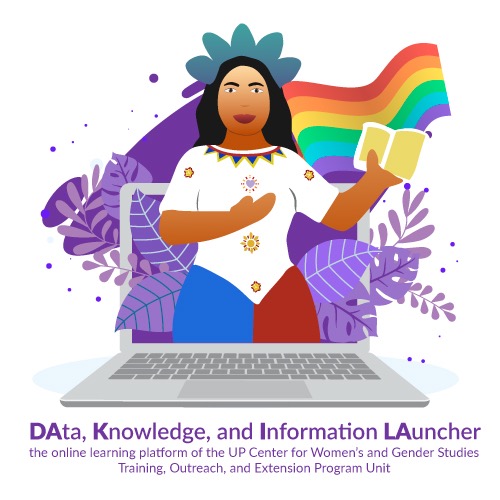Resources
Data, Knowledge, and Information Launcher (DaKILa)
Named after Dakila, DaKILa (Data, Knowledge, and Information Launcher) Online Learning Platform is the gender-responsive online learning platform created by the UP Center for Women’s and Gender Studies (UPCWGS) in 2020 to continuously address and sustain the gender-responsive training needs of various organizations and institutions, within and outside of UP, amid the COVID-19 pandemic.
Powered by Moodlecloud, it provides a safe, inclusive, and conducive virtual learning space for UPCWGS trainees in terms of the accomplishment of asynchronous activities in an online training setup. Unofficially, DaKILa is the first online learning platform in the country solely dedicated to the provision of gender-responsive training programs and courses.

Reference Materials
The Reference Materials page serves as a centralized repository for key documents, policies, and guidelines related to gender equality, anti-sexual harassment, and inclusive practices. It includes national laws, institutional memoranda, and planning frameworks that support gender-responsive initiatives and uphold the rights of all individuals within academic and organizational settings. This collection provides easy access to essential references for policy development, awareness, and implementation.
Sexual Health and Empowerment (SHE) Project Creative Modules
The “Sexual Health and Empowerment (SHE) Project Creative Modules” page by the University of the Philippines Center for Women’s and Gender Studies (UPCWGS) features “Pasya, Laya, at Sining: Reshaping SRHR from the Margins,” a collection of creative modules aimed at promoting sexual and reproductive health and rights (SRHR) through inclusive, participatory approaches. Developed in partnership with Oxfam Pilipinas, these modules—Creative Movement, Life Stories, and Visual Arts—are grounded in feminist research principles and intersectional analysis, centering the voices of marginalized groups such as LGBTQ+ individuals, persons with disabilities, indigenous peoples, and others. The modules serve as tools for educators, advocates, and community organizers to facilitate dialogue, empowerment, and transformative action around SRHR, gender equality, and social justice.
[Updated: 3 May 2025]
